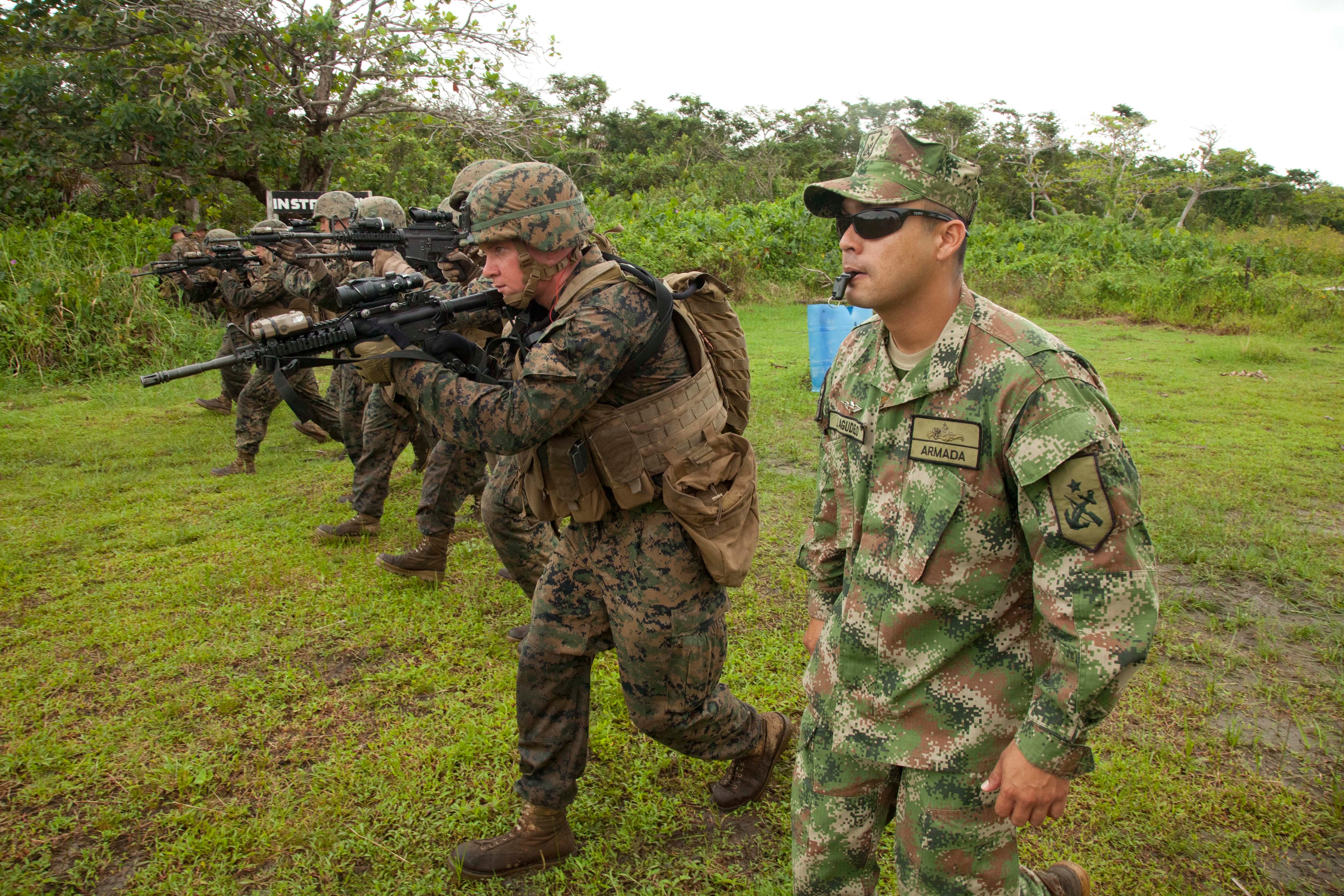![110406-M-GZ696-0005 [ID=21419037]](http://www.gannett-cdn.com/-mm-/521cd80a4fb9f1f1edf37d025629b379daee5bba/r=500x332/local/-/media/2015/01/07/GGM/MarineCorpsTimes/635562602545766116-colombian-marines.jpg)
This story first appeared in the July 7, 2014, issue of Marine Corps Times.
LA CEIBA, Honduras — When members of the naval infantry here discovered a secret runway used by narcotics traffickers to fly drugs across the border, engineers with the Colombian marines showed them how to blow it up.
The Hondurans now use the airstrip, which lies next to a riverbed, for training scenarios. And it's the Colombians — experts in riverine operations — who are leading the amphibious training events.
How did the Colombians become so proficient? The U.S. Marine Corps.
U.S. Marines have worked closely with their Colombian counterparts for generations — particularly over the past decade — and the Colombians are now sharing that expertise with friendly nations across the Americas.
"Right now, we are already developing training activities with allies like Panama, Costa Rica, Guatemala, Honduras and the Dominican Republic," Maj. Gen. Hector Pachon Cañon, the Colombian marines' commanding general, told Marine Corps Times. "In those countries right now are Colombian marines, spreading training we received from the United States Marines."
The influence of the U.S. Marines is apparent in everything the Colombians do, from their boot camp and uniforms to the importance they place on ethos and noncommissioned officers' leadership traits, said Maj. Mike Alvarez, a spokesman with Marine Corps Forces South. They have excelled at developing good training and planning, he added, allowing them to establish the most capable riverine force in the world.
In June, 1st Lt. Vidal Rodriguez, an infantry officer now serving as the officer-in-charge of the Security Cooperation Team here, saw some of the riverine training the Hondurans were getting from the Colombians. He wanted to learn more.
"They talked about how they split their platoons into assault, support and security, and I said, 'No way, that's what we do,'" Rodriguez said. "It's just amazing to meet someone from a different country and we speak the same language as far as tactics. How they attack a problem is the same — they think like we do."
Honduran Lt. Cesar Balderramos, the battalion logistics officer here, said the Colombians bring a high level of proficiency to riverine training events because they regularly perform those types of operations in their own country. For countries like Honduras and Colombia, where troops are fighting drug traffickers and cartels on a daily basis, controlling brown waterways is vital.
"It's very rewarding to have the Colombian marines training here because we're thirsty for knowledge," Balderramos said. "We absorb it right away."
Our No. 1 partner
Brig. Gen. David Coffman, MARFORSOUTH's commander, describes the relationship with the Colombian marines as the Corps' No. 1 enduring partnership in the region. It is a model of what can emerge from long-term institutional development, he said. And that's something other developing naval infantries can emulate.
"Senior U.S. officials in State and Defense will tell you that the mil-to-mil relationship between the United States and Colombia is the best they have ever seen anywhere in the world," Coffman said. "The Colombians will tell you that a number of [their] marines are alive today because of their training partnership with the United States Marine Corps, which has made them more lethal, more survivable, and more agile in the long and difficult fight to save their country from the narco-traffickers."

Marines conduct advanced marksmanship training alongside Colombian marine infantry personnel in Matuntugoas as a part of subject matter expert exchange during Exercise Southern Partnership.
Photo Credit: Spc. Juancarlos Paz/U.S. Southern Command
Over the past decade, the number of Colombian marines has grown by almost half, from 16,000 to 23,000, Alvarez said. As they expanded, the Colombians adapted the way the Corps trained and cultivated its Marines — from entry level all the way up through their military occupational specialties, Pachon said.
"We've been successful in combating criminal gangs, guerillas and narco-traffickers because of those fundamental principles we received from [U.S.] Marines," he said.
With countries like Honduras facing similar threats, Coffman said, Colombia is now better positioned to train other forces in the region than U.S. Marines. In spreading interoperability through shared training and tactics, the Marine Corps' brand has essentially been outsourced. Now just a decade after the Marine Corps began investing heavily in the Colombian marines, they have become completely self-sufficient in advanced military skills training, Alvarez said.
"They are the best instructors in the world to assist Central American security forces facing similar operating environments," he said.




